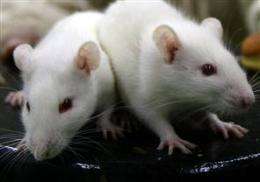March 5, 2010 report
Overfed rats may distort research results

(PhysOrg.com) -- Many laboratory animals are over-fed and under-excercised, and failing to recognize this may lead researchers to misinterpret the results of their experiments, according to a new study by the Laboratory of Neurosciences at the US National Institute on Aging in Bethesda, Maryland.
The researchers found that many rodents used in laboratories have constant access to food, but little access to exercise. As a result many are overweight, under-exercised, glucose-intolerant, and heading for premature death. In some cases, “fat rats” can weight up to 1 kg. The results of experiments on overweight rats and mice, such as those done in the development of therapeutic drugs, may therefore not apply to animals of normal weight.
Mark Mattson, co-author of the paper, published by the Proceedings of the National Academy of Sciences (PNAS), said “the vast majority of investigators” using rats and mice do not recognize or take into account the fact that the conditions in which they are kept are generally unhealthy. Mattson said the data obtained from these animal models would be most relevant to people who are sedentary and overweight, rather than those who are active and healthy weight.
According to the research group, beneficial effects found in laboratory studies for a therapeutic drug or behavior must be reinterpreted in the light of the animals’ unhealthy lifestyles, including research showing that lifespans can be extended by caloric restriction. Mattson said the main reason lifespan of rodents is extended is because they are beginning from an unhealthy state.
Other research results that may need to be re-examined include those on cancer treatments, neurological disorders such as Alzheimer’s disease, and immune functions. The obesity of the laboratory rats and mice means, for example, that the health problems and diseases they develop in drug studies may be mistaken for side-effects, when they are in fact simply related to being overweight. Mattson notes that many biological processes, such as inflammation and susceptibility to disease, are affected by diet and exercise, so while “fat rats” are good models for obesity research, treatments that work on these overweight animals may be ineffective, skew the results, or produce novel side effects in individuals of healthy weight.
Mattson suggested the problem could be overcome by encouraging researchers to adopt measures such as feeding only on alternate days, and providing exercise wheels in cages.
More information: 'Control' laboratory rodents are metabolically morbid: Why it matters, Bronwen Martin et at., Published online before print March 1, 2010, doi:10.1073/pnas.0912955107
© 2010 PhysOrg.com














